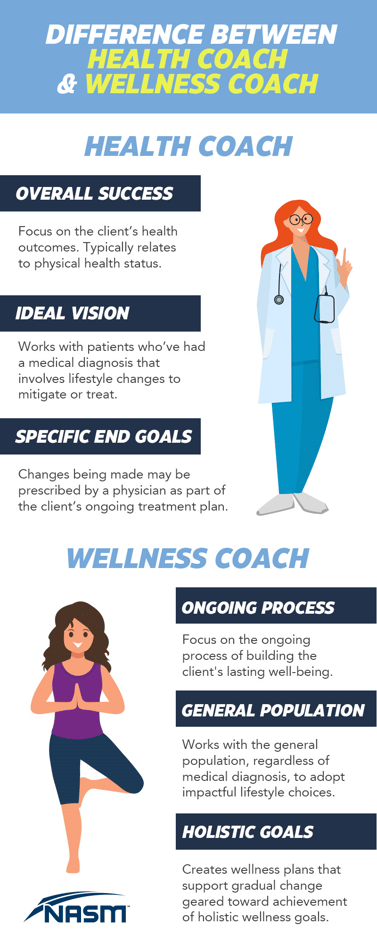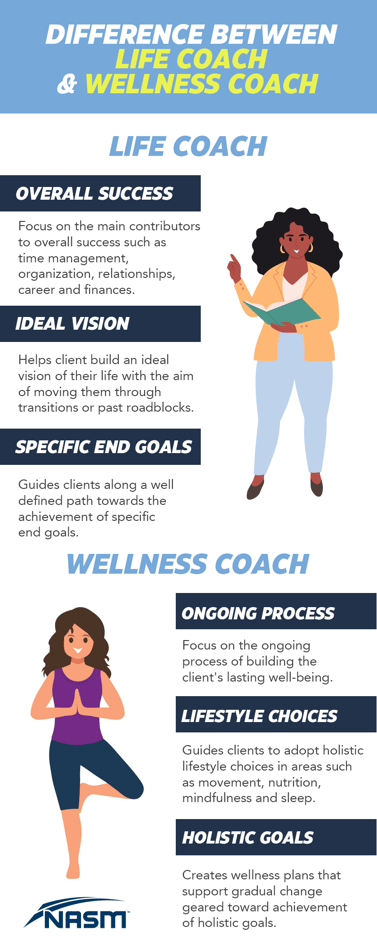Most people know what they “should” do to foster a life of wellness.
Eat a balanced diet and avoid processed foods, get regular movement, prioritize sleep, reduce stress, and cultivate a positive outlook on life that includes purpose, meaning, and connection with others.
Yet, this seemingly simple checklist and the resulting satisfaction with life and well-being allude many.
Wellness coaches have a unique opportunity to support their clients in building lasting and meaningful lifestyle change and personal transformation towards well-being.
💪 Interested in becoming a wellness coach? Click here to get started today.
In this article, we’ll cover…
- What is a wellness coach?
- Why are Wellness Coaches important?
- What are some jobs you can get as a Wellness Coach?
- How to become a Wellness Coach
- What's the difference between a Health Coach, Life Coach, & Wellness Coach?
What is a Wellness Coach?
The overlapping terms fitness, wellness, and well-being are often confused within the fitness industry and the public. Wellness is defined by NASM as “an individual’s personal journey toward the mental, physical, social, and emotional betterment of life.”
Translation: it’s not only someone’s healthy behaviors or habits, but the process of making ongoing and informed choices which in turn make that person’s life better, healthier, more connected, and emotionally satisfying.
A wellness coach’s job is to support an individual in the process of making those choices. It’s important to emphasize that wellness coaching is not prescriptive, meaning they don’t tell their clients what to do. Instead they help their client to examine their choices for themselves, moving along an iterative, personalized, and unique wellness journey.
Wellness coaches understand the science behind the behaviors that build holistic wellness and wellbeing. Then they use their unique gifts and expertise to support their clients. This coaching role is unique among health, fitness, and wellness professionals.
Let’s look at an example…
Coaches often work with other allied professionals, such as a personal trainer or healthcare provider. With both a fitness professional or a doctor, your client will rely on their expertise to make a prescription. They're told exactly what to do, whether it's how many sets and reps or what medication to take.
However, research in behavior change tells us that being told what to do isn't the most effective way to make long term positive change.
That's why in coaching the focus is on guiding a client's internal process. So they can make and keep sustainable change going long after coaching is over.
Wellness Coach Skills
Wellness coaches skills are focused in the established domains such as nutrition, sleep, movement, and recovery practices as well as emotional health, stress management, psychological recovery, and mindset.
Wellness coaches help clients to establish subjective and objective goals related to their wellness and then explore the obstacles and areas of challenge on the pathway to those goals. Another unique aspect of wellness coaching is its emphasis on self-care and self-compassion.
Wellness coaches encourage their clients to prioritize their own needs and to be kind to themselves throughout their wellness journey, rather than pushing themselves too hard or feeling guilty for slip-ups.
Overall, wellness coaching is a unique approach to fitness and wellness that recognizes the interconnectedness of various aspects of a person's life and prioritizes individualized care and self-compassion.
💪 Interested in becoming a Wellness Coach? Check out our Certified Wellness Coach course to learn more!
What Can a Wellness Coach do?
Coaches typically meet with their clients for either one-on-one or small group sessions. During their sessions, they support clients with a variety of tools to examine not only their behavior but their mental and emotional reactions to that behavior.
Together coach and client create action plans, brainstorm solutions, and troubleshoot potential obstacles to the clients’ long-term success. Though the coach is supportive and provides information the onus is on the client to decide what works for them.
Are Wellness Coaches like therapists?
Coaches are not therapists and therefore do not diagnose or treat mental or physical disease or dysfunction. However, sub-clinical challenges are likely to come up.
Certified coaches are trained in how to support the client through examining their emotional or behavioral challenges and can teach clients related mental and emotional skills. These problem-solving skills don’t only help the client to reach their current goals but are ongoing tools that propel clients forward long after the current session.
These skills might include…
- in-the-moment reframing of internal dialogue and self-talk
- how to break down goals
- examine and understand emotional reactions to behavior
- dealing with shame
- focusing on strength
- finding motivation when feeling stuck
Why Wellness Coaches Are Important
Change can be hard. According to the Boston Medical Center, an estimated 45 million Americans go on a diet each year and Americans spend $33 million annually on diet products yet nearly two-thirds of Americans are overweight or obese.
Similarly, the CDC reports that in 2015 68% of smokers said they wanted to quit and in 2018 55% of smokers attempted to quit but only 7.5% were successful.
The CDC also reports that only 1 in 4 American adults gets the recommended amount of physical activity and 31 million Americans over 50 are sedentary, costing $117 billion annually in elevated health care costs.
People often know what to do, but struggle with how to fit healthful behaviors into their lives in lasting and positive ways.
The Benefits of Coaching
Over the last few decades, research has evolved techniques for how to positively support change. Coaching allows for a neutral party in one’s life to provide evidence-based information, reflect on current behavior, and brainstorm possible solutions.
They do so with unconditional positive regard, the judgment-free position of supporting their client to make lasting changes that work for them.
Wellness coaches are trained not only in coaching but have information on lifestyle practices related to wellness. This is a unique combination of physiological understanding with psychological tools that support the betterment of one’s life.
How Wellness Coaches Promote Lasting Change
This unique combination of tools also allows a coach to support the client in priming compounding positive change.
Leveraging phenomena such as the transfer effect, where a positive change in one area of life creates positive change in another, or upward spirals, where the emotional boost from meaningful changes creates the opportunity for more difficult changes to occur.
By understanding how these mechanisms work and how to spark a wellness coach supports their client not only in the immediate future but in building lasting changes which create the opportunity for a transformative lifestyle change.
What are some jobs you can get as a Wellness Coach?
Wellness Coaching is a fast-evolving field and the demand for wellness coaches is growing. In addition to working privately, some possible jobs include working for…
- Coaching companies
- Gyms and health clubs
- Corporations with wellness initiatives
1. Coaching companies
Coaches who appreciate the security of working for someone else may seek to be hired by a coaching company. The company employs groups of coaches, from a small handful to hundreds of coaches, and provides marketing, session outlines, and on-brand tools. The client pays the company who matches the client with the coach.
Benefits of working for a coaching company
- Low overhead
- Easy access to clients
Drawbacks of working for a coaching company
- The company sets your pay scale
- Clients connect with the company and brand and may not stay with you as their coach, and the firm may dictate what your coaching sessions work on to ensure consistency across the company.
2. Gyms & health clubs
With the increasing importance of mental and emotional well-being in people's lives, wellness coaches have the opportunity to offer their services in a variety of settings, including gyms and health clubs.
As more people prioritize wellness and seek out holistic solutions, offering wellness coaching services can be a valuable addition to a club's offerings or a separate service that members can pay for.
Depending on the circumstances, wellness coaching can be tailored to the needs of long-term gym members or visitors to a resort, spa, or short-term facility.
Benefits of working at gym or health club
- Pool of available members
- Comradery of like-minded co-workers and community
- Stability of employment by the facility
- Low overhead
Drawbacks of working at a gym or health club
- Facility sets the pay scale
- Limited pool of people to work with
- Company may have a particular structure they want a coach to focus on
3. Corporations
The newest of these options are the emerging opportunities for Wellness Coaches working within companies that have wellness offerings as employment perks.
These may be led by HR professionals who have sought wellness coaching education and expanded offerings, hired an internal coach, or kept an external coach on retainer to offer to employees. Circumstances vary and are continuing to grow and change.
As people come to focus more on not only preventative health but how to build wellness into their lives the opportunities for Wellness Coaches will continue to evolve.
For those interested in helping others take an additive approach to life and living, becoming a Wellness Coach is a rewarding and fun career path.
How Much do Wellness Coaches Make?
According to Salary.com, the median income for a Health and Wellness Coach is $61,000 with the typical salary range falling between $53,000 and $68,000.
Those new to the practice will likely make less while they establish their business, and those with specialized expertise and long-term practices may charge a higher hourly rate or form other streams of related income.
How to Become a Wellness Coach
Wellness coaching is unregulated, but ethical practitioners will want to seek certification to build a strong skill set and help their clients. Certification ensures that the support and recommendations given to clients not only create meaningful changes but also do not create potential harm.
Join NASM’s Certified Wellness Program
Those interested in coaching may want to consider the NASM Certified Wellness Coach program.
NASM’s Certified Wellness Coaching program provides science-based knowledge in movement, nutrition, mental and emotional well-being, recovery and regeneration, and coaching strategies so you can help your clients achieve long-term positive behavior change.
What is the Difference Between a Health Coach, Life Coach, & Wellness Coach?
These leaders work with individuals or small groups supporting self-directed change toward the client’s goals. It’s not a leader’s job to tell their clients what to do. They guide, give relevant information, and provide support while each client decides what’s right for them.
Using techniques like Motivational Interviewing, tools from Positive Psychology and the science of behavior change coaches support clients in changing.
Within that framework different coaches have different focuses on what kinds of change they support:
- Life Coaches focus on the main factors of a person’s life including time management, productivity, professional goals and projects, relationships, life goal setting, leadership, career development, self-care, and financial goals.
- Health Coaches work with individuals who have a medical diagnosis or health condition. A health coach helps the client implement lifestyle changes related to the management or care of their health as part of the care team.
- Wellness Coaches support clients in the ongoing process of building wellness through movement, nutrition, sleep, recovery and regeneration, and stress management with a focus on their holistic lifestyle choices.
What Is the Difference Between a Health and Wellness Coach?
The primary differences between a health coach and a wellness coach are their focus of work, who their clients are, and if the changes are prescribed.
What Wellness Coach help clients address
A wellness coach focuses on the ongoing process of a client’s overall wellness. Outcome-based goals will be chosen by the client as well as the focus of the program overall. Individual coaches may choose to specialize in a particular group of people, such as new dads or women over 50.
The changes being made are driven by the client’s self-directed goals and desired outcomes.
What Health Coaches help clients address
In contrast, a health coach focuses on the health outcomes of their client, typically related to their physical health status.
A health coach works with individuals who’ve had a clinical diagnosis that requires sustained lifestyle changes.
Making those changes can have a long-term health benefit, like the dietary and exercise changes needed to combat a rising A1C before it develops into diabetes. Many of these changes will be prescribed by the physician or other medical professional managing the client’s care.

What does a Health Coach do?
While individuals may hire a health coach they may also be partnered with a physician or provided by the insurance company when an individual is diagnosed with a chronic illness.
Whether working 1-on-1 or in a small group, the coach will help the client set goals related to their physical health, share relevant information, and identify necessary lifestyle changes to meet their goals.
Then the health coach will use common coaching techniques to support the client in making those changes.
Is a Life Coach the Same Thing as a Wellness Coach?
Life Coaching and Wellness Coaching are not the same. There are differences in expertise, the tools used, and the scope between Life and Wellness Coaching.
What Life Coaches help clients address
Depending on the life coach's training and focus, they may help with personal organization, time management, career development, focus, productivity, relationships, finances, and more. This broad focus can help take a 360 view of one’s life and move through significant transitions or other life changes.
What Wellness Coaches help clients address
Because the scope of wellness coaching is more focused, the coach and client can work together to go more explicitly into the factors affecting the client’s wellness. A certified wellness coach is educated in more detail on nutrition, sleep, stress management, movement, and other factors affecting wellness.

What does a Life Coach do?
Clients may seek out working with a life coach individually or sometimes through their employer. They may work 1-on-1 or in small groups. The life coach will support their clients in setting goals in the various domains of life including career, home, relationship, family, financially, spiritually, and others depending on the specialty of the coach.
A life coach will share information and resources relevant to their client’s goals and work through self-limiting beliefs and patterns that are blocking the client’s progress.
summary
- A wellness coach is a trained professional who assists clients in achieving their health and wellness goals by providing support, guidance, and accountability.
- Wellness is defined as an individual's journey towards mental, physical, social, and emotional betterment.
- The skills of a wellness coach include helping clients establish goals related to wellness, exploring obstacles, and empowering clients to make their own decisions.

















